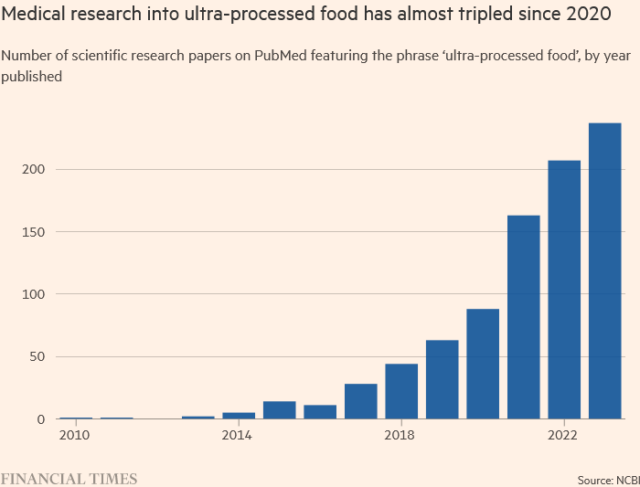When the Brazilian dietary scientist Carlos Monteiro coined the time period “ultra-processed meals” 15 years in the past, he established what he calls a “new paradigm” for assessing the impression of weight loss plan on well being.
Monteiro had observed that though Brazilian households have been spending much less on sugar and oil, weight problems charges have been going up. The paradox could possibly be defined by elevated consumption of meals that had undergone excessive ranges of processing, such because the addition of preservatives and flavorings or the removing or addition of vitamins.
However well being authorities and meals corporations resisted the hyperlink, Monteiro tells the FT. “[These are] individuals who spent their entire life pondering that the one hyperlink between weight loss plan and well being is the nutrient content material of meals … Meals is greater than vitamins.”
Monteiro’s meals classification system, “Nova,” assessed not solely the dietary content material of meals but additionally the processes they bear earlier than reaching our plates. The system laid the groundwork for 20 years of scientific analysis linking the consumption of UPFs to weight problems, most cancers, and diabetes.
Research of UPFs present that these processes create meals—from snack bars to breakfast cereals to prepared meals—that encourages overeating however might depart the eater undernourished. A recipe may, for instance, comprise a stage of carbohydrate and fats that triggers the mind’s reward system, which means it’s important to eat extra to maintain the pleasure of consuming it.
In 2019, American metabolic scientist Kevin Corridor carried out a randomized examine evaluating individuals who ate an unprocessed weight loss plan with those that adopted a UPF weight loss plan over two weeks. Corridor discovered that the themes who ate the ultra-processed weight loss plan consumed round 500 extra energy per day, extra fats and carbohydrates, much less protein—and gained weight.

The rising concern concerning the well being impression of UPFs has recast the talk round meals and public well being, giving rise to books, coverage campaigns, and educational papers. It additionally presents essentially the most concrete problem but to the enterprise mannequin of the meals business, for whom UPFs are extraordinarily worthwhile.
The business has responded with a ferocious marketing campaign in opposition to regulation. Partly it has used the identical lobbying playbook as its struggle in opposition to labeling and taxation of “junk meals” excessive in energy: large spending to affect policymakers.
FT evaluation of US lobbying knowledge from non-profit Open Secrets and techniques discovered that meals and smooth drinks-related corporations spent $106 million on lobbying in 2023, nearly twice as a lot because the tobacco and alcohol industries mixed. Final yr’s spend was 21 p.c greater than in 2020, with the rise pushed largely by lobbying referring to meals processing in addition to sugar.
In an echo of techniques employed by cigarette corporations, the meals business has additionally tried to stave off regulation by casting doubt on the analysis of scientists like Monteiro.
“The technique I see the meals business utilizing is deny, denounce, and delay,” says Barry Smith, director of the Institute of Philosophy on the College of London and a guide for corporations on the multisensory expertise of food and drinks.
Thus far the technique has proved profitable. Only a handful of nations, together with Belgium, Israel, and Brazil, presently seek advice from UPFs of their dietary pointers. However as the load of proof about UPFs grows, public well being specialists say the one query now’s how, if in any respect, it’s translated into regulation.
“There’s scientific settlement on the science,” says Jean Adams, professor of dietary public well being on the MRC Epidemiology Unit on the College of Cambridge. “It’s learn how to interpret that to make a coverage that individuals aren’t certain of.”
